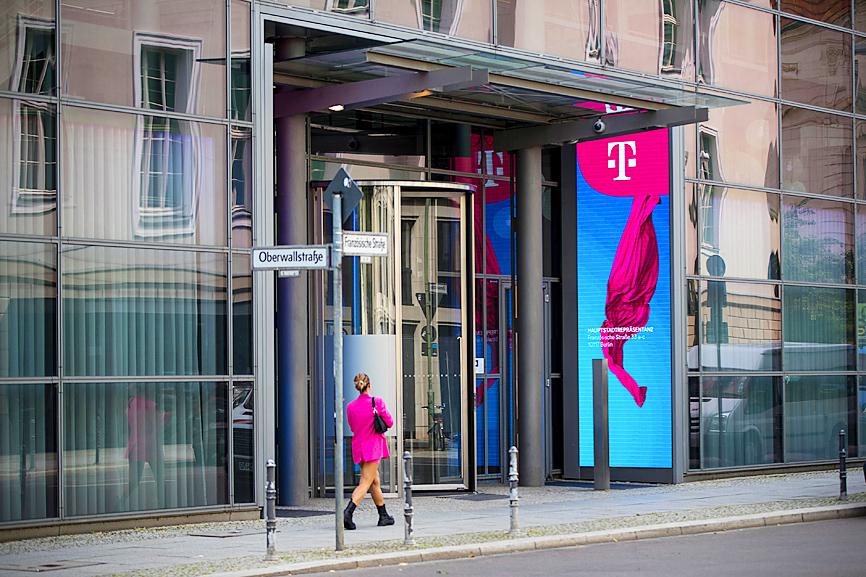US tech giants should bear some of the costs of developing Europe’s telecoms networks because they use them so heavily, chief executives of Deutsche Telekom AG, Vodafone Group PLC and 11 other major European telecoms said yesterday.
The call by the CEOs comes as the telecoms industry faces massive investments for 5G, fiber and cable networks to cope with data and cloud services provided by Netflix Inc and Google’s YouTube and Facebook Inc.
Investments in Europe’s telecom sector rose to 52.5 billion euros (US$59.4 billion) last year, a six-year high.

Photo: Bloomberg
“A large and increasing part of network traffic is generated and monetized by big tech platforms, but it requires continuous, intensive network investment and planning by the telecommunications sector,” the CEOs said in a joint statement seen by Reuters.
“This model — which enables EU citizens to enjoy the fruits of the digital transformation — can only be sustainable if such big tech platforms also contribute fairly to network costs,” they said.
The CEOs did not mention any tech firms by name, but Reuters understands that US-listed giants, such as Netflix and Facebook, are companies they have in mind.
Signatories to the letter include the CEOs of Telefonica SA, Orange SA, KPN NV, BT Group PLC, Telekom Austria, Vivacom, Proximus SA, Telenor ASA, Altice Portugal SA, Telia Co and Swisscom AG.
The CEOs also criticized high spectrum prices and auctions, used by EU governments as cash cows, saying that these artificially force unsustainable entrants into the market.
EU lawmakers’ attempts to scrap surcharges on intra-EU calls also got short shrift from the CEOs who see this sector as a source of revenue from business users.
“We estimate that they would forcibly remove over 2 billion euros revenues from the sector in a four-year period, which is equivalent to 2.5 percent of the sector’s yearly investment capacity for mobile infrastructure,” the companies said.
EU lawmakers have to discuss their proposal with EU countries before it can be adopted and may struggle to find agreement.

South Korea’s equity benchmark yesterday crossed a new milestone just a month after surpassing the once-unthinkable 5,000 mark as surging global memory demand powers the country’s biggest chipmakers. The KOSPI advanced as much as 2.6 percent to a record 6,123, with Samsung Electronics Co and SK Hynix Inc each gaining more than 2 percent. With the benchmark now up 45 percent this year, South Korea’s stock market capitalization has also moved past France’s, following last month’s overtaking of Germany’s. Long overlooked by foreign funds, despite being undervalued, South Korean stocks have now emerged as clear winners in the global market. The so-called “artificial intelligence

‘SEISMIC SHIFT’: The researcher forecast there would be about 1.1 billion mobile shipments this year, down from 1.26 billion the prior year and erasing years of gains The global smartphone market is expected to contract 12.9 percent this year due to the unprecedented memorychip shortage, marking “a crisis like no other,” researcher International Data Corp (IDC) said. The new forecast, a dramatic revision down from earlier estimates, gives the latest accounting of the ongoing memory crunch that is affecting every corner of the electronics industry. The demand for advanced memory to power artificial intelligence (AI) tasks has drained global supply until well into next year and jeopardizes the business model of many smartphone makers. IDC forecast about 1.1 billion mobile shipments this year, down from 1.26 billion the prior

People stand in a Pokemon store in Tokyo on Thursday. One of the world highest-grossing franchises is celebrated its 30th anniversary yesterday.

Chinese artificial intelligence (AI) start-up DeepSeek’s (深度求索) latest AI model, set to be released as soon as next week, was trained on Nvidia Corp’s most advanced AI chip, the Blackwell, a senior official of US President Donald Trump’s administration said on Monday, in what could represent a violation of US export controls. The US believes DeepSeek will remove the technical indicators that might reveal its use of American AI chips, the official said, adding that the Blackwells are likely clustered at its data center in Inner Mongolia, an autonomous region of China. The person declined to say how the US government received